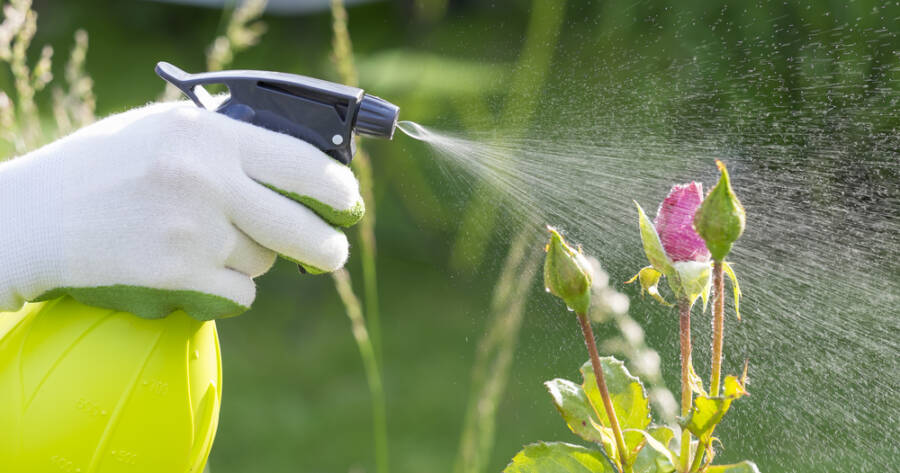Garden pests can be relentless but reaching for harsh chemical sprays isn’t the only solution. There are simple, natural ways to protect your plants while keeping your pets and local wildlife safe. From homemade sprays to clever barriers and garden-friendly insects, these pest control methods work with nature, not against it. Whether you’re dealing with aphids, slugs, or sneaky caterpillars, your garden can stay healthy and chemical-free with a few smart swaps and tactics.
Try a Gentle Dish Soap Spray
One of the easiest and safest pest control methods is a basic dish soap spray. When diluted correctly, it can disrupt soft-bodied pests like aphids, spider mites, and whiteflies without harming your plants or pets. Mix a few drops of unscented, biodegradable dish soap with water in a spray bottle and lightly mist affected areas.
This method works best when applied in the early morning or late afternoon to avoid leaf burn. The soapy solution clogs pests’ breathing pores, but it breaks down quickly and won’t linger in your garden. Always test a small patch of your plant first, just in case it’s sensitive. It’s an inexpensive, low-risk solution that packs a surprising punch.
Make a Homemade Garlic or Chili Spray
Garlic is more than a kitchen staple, it’s a natural pest repellent with potent properties. A garlic spray can deter a range of unwanted insects, including beetles, caterpillars, and aphids. Simply blend a few cloves of garlic with water, strain, and spray directly onto plant leaves. For an extra kick, add a small amount of cayenne pepper or chili powder.
This spray doesn’t kill pests, but its strong scent and taste make plants unappetizing. It’s safe for pets, kids, and pollinators when used sparingly and away from flowering blooms. Reapply after rainfall or every few days for best results. The bonus? It’s all-natural, inexpensive, and gives your garden a subtle edge against invaders.
Invite Natural Predators to Do the Dirty Work
Not all bugs are bad. Ladybugs, lacewings, birds, and frogs can be some of your greatest allies in pest control. By attracting these natural predators to your garden, you create a self-regulating ecosystem where pests are kept in check without your constant intervention.
To welcome these beneficial creatures, plant native flowers like yarrow, dill, or fennel. Add a shallow water source, build a simple bug hotel, or let a section of your yard grow wild. Avoid chemical sprays that harm good bugs along with the bad. The more balance you encourage, the less you’ll need to step in with extra help.
Use Physical Barriers To Block Pests Out
Sometimes the simplest solution is the most effective: keep pests out in the first place. Physical barriers like mesh row covers, netting, and collars around plant stems can protect your crops without adding anything to the soil. These options are particularly useful against cabbage worms, squash bugs, and birds looking for a snack.
Floating row covers still allow light and water through, while deterring flying insects from laying eggs. Copper tape around pots deters slugs and snails with a harmless static charge. You can even upcycle items like old window screens or mesh laundry bags. No sprays, no traps—just solid prevention.
Sprinkle Diatomaceous Earth for Crawling Pests
Diatomaceous earth is a powder made from fossilized algae that’s deadly to bugs but harmless to humans and pets when used correctly. It works by dehydrating soft-bodied insects like ants, fleas, and slugs. Simply sprinkle a thin layer around the base of plants or along pest trails for a natural line of defense.
Be sure to use food-grade diatomaceous earth and wear a mask when applying, as the fine dust can irritate your lungs. Reapply after rain or heavy watering for continued effectiveness. It’s a great choice for gardeners who want hands-off protection that lasts for days with minimal effort.
Use Companion Planting To Confuse and Repel Pests
Companion planting is a smart way to confuse or repel pests using the power of plant chemistry. Some plants give off natural scents or oils that bugs dislike. Marigolds, for example, repel nematodes and aphids, while basil can deter flies and mosquitoes. Plant them alongside your veggies to create a more resilient garden.
This method also encourages biodiversity, which helps limit pest outbreaks. Mixing herbs, flowers, and vegetables can disrupt the scent trails pests rely on, making it harder for them to target your crops. It’s a subtle but effective strategy, and it adds beauty and variety to your yard, too.
A Safer Way To Garden Smarter
Natural pest control isn’t just about avoiding chemicals–it’s about working with your garden’s ecosystem to keep it thriving. When you use gentle sprays, welcome helpful insects, and add a few smart barriers, you create an environment that’s safer for your plants, pets, and family. These small shifts in approach can make a big difference over time, giving you a vibrant, balanced garden without the worry of harmful side effects.

